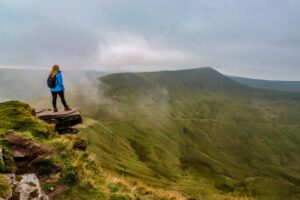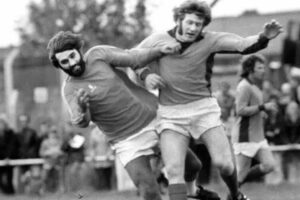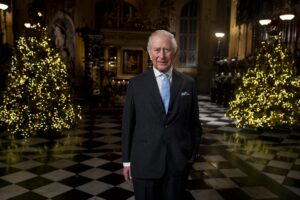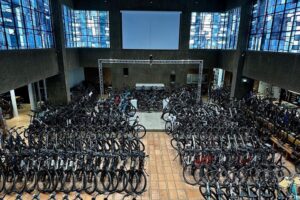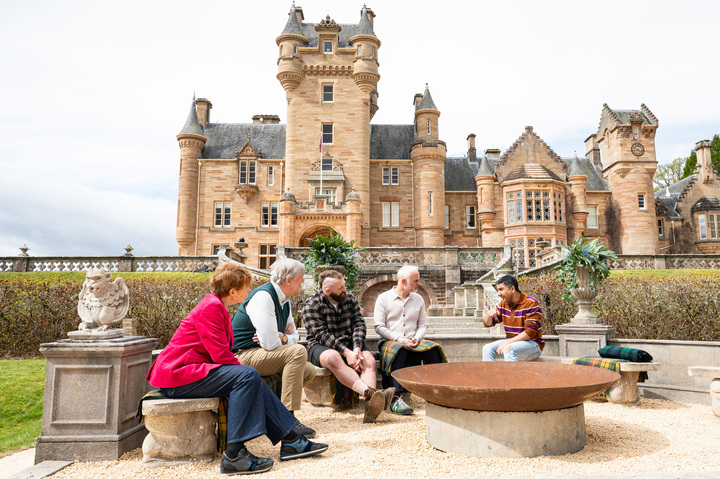
The value of The Traitors to the Scottish economy is said to have “more than tripled” since it first went into production due to the growing use of Scottish crew workers and suppliers to make the series.
The economic impact of The Traitors – nine series of which have been filmed to date at the 19th century castle – is expected to soar further after the BBC confirmed four separate series will be made in one year for the first time.
These are expected to include a new star-studded UK celebrity edition and two new US series. The Traitors is expected to be in production in the Highlands for a record total of 25 weeks in 2026, compared to 17 earlier this year.
The BBC’s report explores the economic impact of nine series of the UK and American versions of the show – hosted by Claudia Winkleman and Alan Cumming respectively – since 2022.
It has been published days after the finale of the first series of The Celebrity Traitors in the UK, with a second now due to be filmed next year.
The economic impact figures published by the BBC are based on employment of Scottish crew members, the involvement of local businesses in making sets and costumes, the use of hospitality and transport operators, and work for catering and construction companies.
The BBC today declared that The Traitors has “helped cement Scotland’s reputation as a global destination for screen production”.
Read More:
Celebrity Traitors: As winner revealed, we’ve found perfect candidate for next series
However it has acknowledged concerns about a lack of senior roles on The Traitors for screen industry workers who are permanently based in Scotland.
The finalists are briefed on the task ahead (Image: BBC/Studio Lambert/Euan Cherry)
The BBC has pledged to work with Studio Lambert, the London-based producers of The Traitors, to provide more training opportunities on the show as well as explore ways to bring in experienced Scottish crew members “so that they can build the expertise needed in this specific format, while maintaining the highest possible quality control”.
The new research has also highlighted the need for new studio space and post-production facilities to be developed in the Highlands to ensure the Scottish screen sector can build on the success of The Traitors and major productions can have “an even greater economic impact” in future.
The full impact – including economic “ripple effects” – of both the UK and US editions of The Traitors in the Highlands – is said to be worth almost seven times as much as direct production spending on the shows, which are all made by Studio Lambert for the BBC, and American broadcasters Peacock and NBC.
The BBC report also highlights further benefits for the tourism and creative industries from The Traitors being made in the Highlands, including a 69 per cent rise in rail bookings to Inverness since the first series were first screened.
The costumes worn by Winkleman and Cumming are said to have sparked new interest in Scottish design and textiles, while VisitScotland and Expedia have reported a surge in internet searches from people seeking to book a “castle holiday” in Scotland.
Ardross Castle, which has been run in recent years as an “exclusive use” venue for weddings, conferences, events, and film and TV productions, has seen a four-fold increase in enquiries since filming on The Traitors got underway and it is now said to be fully booked up throughout the year.
The Traitors effect is said to have helped boost the overall value of the screen sector in the Highlands to more than £52m.
BBC Scotland director Hayley Valentine has told The Herald that at least 60 Scottish crew members have been working on the most recent series of The Traitors.
Read more by Brian Ferguson:
Broadway and Hollywood star returns to Scotland to play iconic Muriel Spark character
The new Scottish stage show inspired by women behind seven month factory ‘sit-in’
Scottish Government asked to back £70m music hub as £5m lottery funding is clinched
She said the new research had found that, since The Traitors went into production in the Highlands, for every crew member based in Scotland a further 14.8 jobs had been created in the wider Scottish economy.
The Scottish Government’s film and TV agency told the BBC’s researchers that more needs to be more to ensure Scotland-based directors, editors and producers are working on the show in future.
Screen Scotland, which has funded training programmes for crew members working on The Traitors, told the BBC that it wanted to see “deeper, higher-quality outcomes that create jobs for Scotland-based crew and drive the creative economy in Scotland” with each subsequent series of The Traitors.
Ardross Castle takes centre stage in The Traitors (Image: free)
The BBC’s report described The Traitors as a “relatively novel production,” adding that it was “critical” that it was able to draw on the full strength of the UK’s production ecosystem to deliver a show of the highest quality to serve UK and global audiences so that investment in the series can be secured in future years.”
The report adds: “The success of The Traitors not only showcases Scotland’s capacity to host major productions but also reinforces the broader economic case for supporting the film and television sector as a driver of sustainable regional and national development.
“Filming, though seasonal, has created a surge in economic activity during its production periods, drawing attention to Scotland as a viable and attractive location for high-profile projects.”
Writing in the new BBC report, Ms Valentine described The Traitors as “an immense TV success story”.
She said: “It has proved to be the audience hit of the year across multiple seasons, with the new celebrity version becoming the most-watched title in its weeks of broadcast.
“It is fantastic that this major TV event is filmed in Scotland, and that alongside the BBC’s series, the US version is also made in our nation.
“Recent independent research commissioned by Screen Scotland has shown that the economic contribution of the screen industry in Scotland goes far beyond the confines of the actual production window itself.
“There is the immediate impact of those working on a title in the local area across many months, there is the supply chain spend in a region with a wide range of businesses, large and small, in the screen sector and beyond, and the wider – and significant – impact on screen tourism, being boosted across Scotland by multiple shows.
“The Traitors is making a substantial contribution to that economic story, especially in the Highlands, and one which should be welcomed.”
Ms Valentine drew a comparison between The Traitors and Doctor Who, highlighting how it had take time for the screen sector in Wales to develop after the BBC decided to base the long-running science fiction series there more than 20 years ago.
She added: “It has probably been about a quarter of a century, the days of Castaway, since high-end reality entertainment television has been made in Scotland to the production standard of The Traitors.
“As such, it has been necessary for the production to bring colleagues with existing reality entertainment skills to Scotland from all around the UK and the world to make the show.
“However, we also have an ambition to grow the number of Scotland-based crew who work on it. That has been happening.
“The numbers of Scotland-based crew have increased since the first series, as more people here have become skilled in reality entertainment.
“I am grateful for the support that Screen Scotland has provided, partnering Studio Lambert to help bring about this growth.”
Ed Havard, senior vice president at NBC, said: “The Traitors is a calling card for Scotland’s screen industry and proof that Scotland is a great place to produce a global hit.”
Screen Scotland director David Smith said: “We’re happy with what we’ve been able to achieve in quite a short period of time this year, working with the BBC and Studio Lambert.
“We would like to go further and work with them to ensure Scotland-based directors, editors and producers work within The Traitors structure and within Studio Lambert more broadly and I think we’ve got the good foundation for a really positive relationship there.
“The fact that Studio Lambert is making this in Scotland successfully is in-and-of-itself a good thing.
“But with each subsequent series we want to see deeper, higher-quality outcomes that create jobs for Scotland-based crew and drive the creative economy in Scotland.”
Studio Lambert, NBC, Ardross Castle, VisitScotland, Highlands and Islands Enterprise, the Screen Highland office at Highland Council and a number of local businesses were involved in the BBC’s research.
Jenni Steele, film and creative industries manager at VisitScotland, said: “What stands out is how The Traitors highlights Scottish style and heritage, like tartan, tweed and textiles.
“It’s more than just showing the scenery. It subtly shares Scotland’s culture and gives local businesses a boost. It adds a rich, deeper layer to the show.
“The Traitors embodies that sense of mystery, myths and legends, things people really love about Scotland.
“Scotland has always been a popular on-screen location, turning viewers to visitors.
“Shetland, Outlander and now The Traitors are all making their mark on UK and international travel plans. It seems faithful Traitors fans can’t get enough of our beautiful country.”
